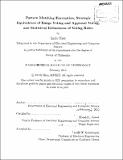Pattern matching encryption, strategic equivalence of range voting and approval voting, and statistical robustness of voting rules
Author(s)
Shen, Emily (Emily Huei-Yi)
DownloadFull printable version (7.527Mb)
Other Contributors
Massachusetts Institute of Technology. Department of Electrical Engineering and Computer Science.
Advisor
Ronald L. Rivest.
Terms of use
Metadata
Show full item recordAbstract
We present new results in the areas of cryptography and voting systems. 1. Pattern matching encryption: We present new, general definitions for queryable encryption schemes - encryption schemes that allow evaluation of private queries on encrypted data without performing full decryption. We construct an efficient queryable encryption scheme supporting pattern matching queries, based on suffix trees. Storage and communication complexity are comparable to those for (unencrypted) suffix trees. The construction is based only on symmetric-key primitives, so it is practical. 2. Strategic equivalence of range voting and approval voting: We study strategic voting in the context of range voting in a formal model. We show that under general conditions, as the number of voters becomes large, strategic range-voting becomes equivalent to approval voting. We propose beta distributions as a new and interesting way to model voter's subjective information about other votes. 3. Statistical robustness of voting rules: We introduce a new notion called "statistical robustness" for voting rules: a voting rule is statistically robust if, for any profile of votes, the most likely winner of a sample of the profile is the winner of the complete profile. We show that plurality is the only interesting voting rule that is statistically robust; approval voting (perhaps surprisingly) and other common voting rules are not statistically robust.
Description
Thesis (Ph. D.)--Massachusetts Institute of Technology, Dept. of Electrical Engineering and Computer Science, 2013. Cataloged from PDF version of thesis. Includes bibliographical references (p. 119-123).
Date issued
2013Department
Massachusetts Institute of Technology. Department of Electrical Engineering and Computer SciencePublisher
Massachusetts Institute of Technology
Keywords
Electrical Engineering and Computer Science.